Study Shows 20% of Secondary School Students Exposed to Online Sexual Harassment
ZAGREB, 13 Feb (Hina) - As many as 20% of secondary school students have witnessed or experienced online sexual harassment, and nearly half have seen their peers share sexual content via chat, a profile or forum, according to results of a DeShame study.
The study has shown that children and young people send and receive sexual content (sexting) from people they know and from strangers. Nearly 40% of young people have received sexual content, about 10% of students send their own sexual content, and some of them do so persuaded by another person, because of blackmail or a threat.
Sexting, sexual harassment and violence have become a part of many young people's lives in Croatia, said Lucija Vejmelka, the research leader and professor at the Social Work Study Centre of Zagreb's Faculty of Law.
Sexual behaviour still taboo
"Sexual behaviour is still taboo, so children and young people don't turn to adults when they have a problem, while exposure to sexual harassment has short-term and long-term consequences for the victim. High exposure to violence can seemingly normalize such behaviour, which increases peer pressure and makes intervention more difficult", warned Vejmelka.
Young people are most often exposed to derogatory expressions and descriptions, sexual jokes and sexual jokes and comments about another person getting likes.
Occasionally, they are witness to sexual photos of persons their age being shared, websites or groups on social networks being created for sexual content or gossiping, and photos or videos of sexual intercourse of someone they know being shared, of which only 20% of them spoke up.
Girls experience sexual harassment more often, while young people in general most often experience gossips and lies about their own sexual behaviour.
The study was conducted by the Safer Internet Centre (CSI), with the support of A1 Hrvatska, and 2,016 students of the first and third year of secondary schools across Croatia took part.
The results were presented as part of an event marking Safer Internet Day, and the study was also carried out in Denmark, Hungary and the United Kingdom.
For more news about Croatia, CLICK HERE.
Instead of Waiting for a Job, Split Students Started Their Own Van Transport Business
January 27, 2021 – What is it like to be a student in Croatia at the beginning of 2021? Classes and exams are mostly online, there is no place to drink coffee or go out, and there are almost no student employment opportunities. Still, two Split students do not despair. Instead of waiting for a job to fall from the sky, they used this coronavirus crisis as an opportunity to realize a long-planned wish – to start their own van transport business.
Waitering, working the cash register, selling food and drinks, and stacking goods are just some of the most common student jobs that have, unfortunately, suffered a massive blow in the past year.
Due to the crisis caused by the coronavirus pandemic, many jobs are at risk, and students who are one of the most affected groups on the labor market are rarely mentioned. Working while studying is always challenging. For some students, such work is the only source of income, while for many of them, student work provides additional pocket money.
'We sent countless job applications, but without answers'
When the amount of work of many businesses reduced, especially in tourism and hospitality, students were the first to be hit by the dismissal. Thus, according to data from the Student Center in Zagreb, there were almost half as many employed students from March to September 2020 as in the previous 2019. Students hoped for a better situation in the fall and during the Christmas fairs last year, but due to cafe and restaurants' re-closure in early December, they were again left without earnings.
The situation is not better in Split either. Aware and disappointed with the whole situation, Split students Mario Veljača and Toni Šegović decided to start their own van transport business after many unanswered job applications. Since they could not find a student job, they created it. The lack of employment opportunities was a big blow to them because they financed themselves during all the years of their studies, and they also loved their work routine while studying.

Mario Veljača / Private archive
"As one tries to save on everything in these times of crisis, including the workforce, it is almost impossible to find a job. As students graduating, we have a lot of free time, and we could work full time. We sent countless job applications, but without success, more precisely, without answers," says Mario, a business economics and management student at the Faculty of Economics in Split.
He and his friend Toni, a graduate student of nautical studies at the Faculty of Maritime Studies in Split, fear that they will end up on the job market after graduating this year.
Despite their extensive work experience in the tourism sector, they could not find a job. As time went on, the savings dried up, and state aid for students was lacking. Mario and Toni did not want to sit at home and wait for the situation to pass but took matters into their own hands to not have to depend on their parents, who were also not bypassed by the crisis.
The key is in social media marketing
With almost no start-up capital, they were thinking about possible options, so they came up with the idea of van transport. Their only mitigating circumstance was that, due to a lack of his own business, Mario's girlfriend's father could lend them a van to use.
"We offered him cooperation where we would run all the business and slightly repurpose the original activity of his company. As his company was registered for the transport of goods and passengers, the idea could come to life. He agreed and gave us the green light. We agreed on all the conditions, withdraw the student contracts, and we were ready to start the business," says Mario.

Van transport seems to be a good market niche for two Split students / Source: Pexels
The young duo from Split have been friends for over 15 years and have always planned to start a joint business. They have had some plans before, but they were disrupted by an unpredictable situation that shocked the whole world.
For furniture moving and transport services with their van, they are available in Split-Dalmatia County every day, at any time.
With a well-designed promotional campaign on social networks, they managed to reach their first clients very quickly. As they say, there is always a need for relocation and removal services for old furniture and similar bulky waste, so they have found their place on the market.
Low prices and high effort
"Our work is much more than just taking out and bringing in furniture and driving a van. We spend an entire 8-hour workday devising ideas, creating ads and planning. As we create graphics, pictures, hand out flyers, or do all the marketing, time really flies by," says Mario.
During their average workday, they don't go home until they do everything they can. They want to leave a good impression, be as fast, efficient, and careful as possible, but also more affordable because offering lower prices for their services makes them acceptable. They're aware that many people are currently in a difficult financial situation, so they started their business by offering lower prices for their services.
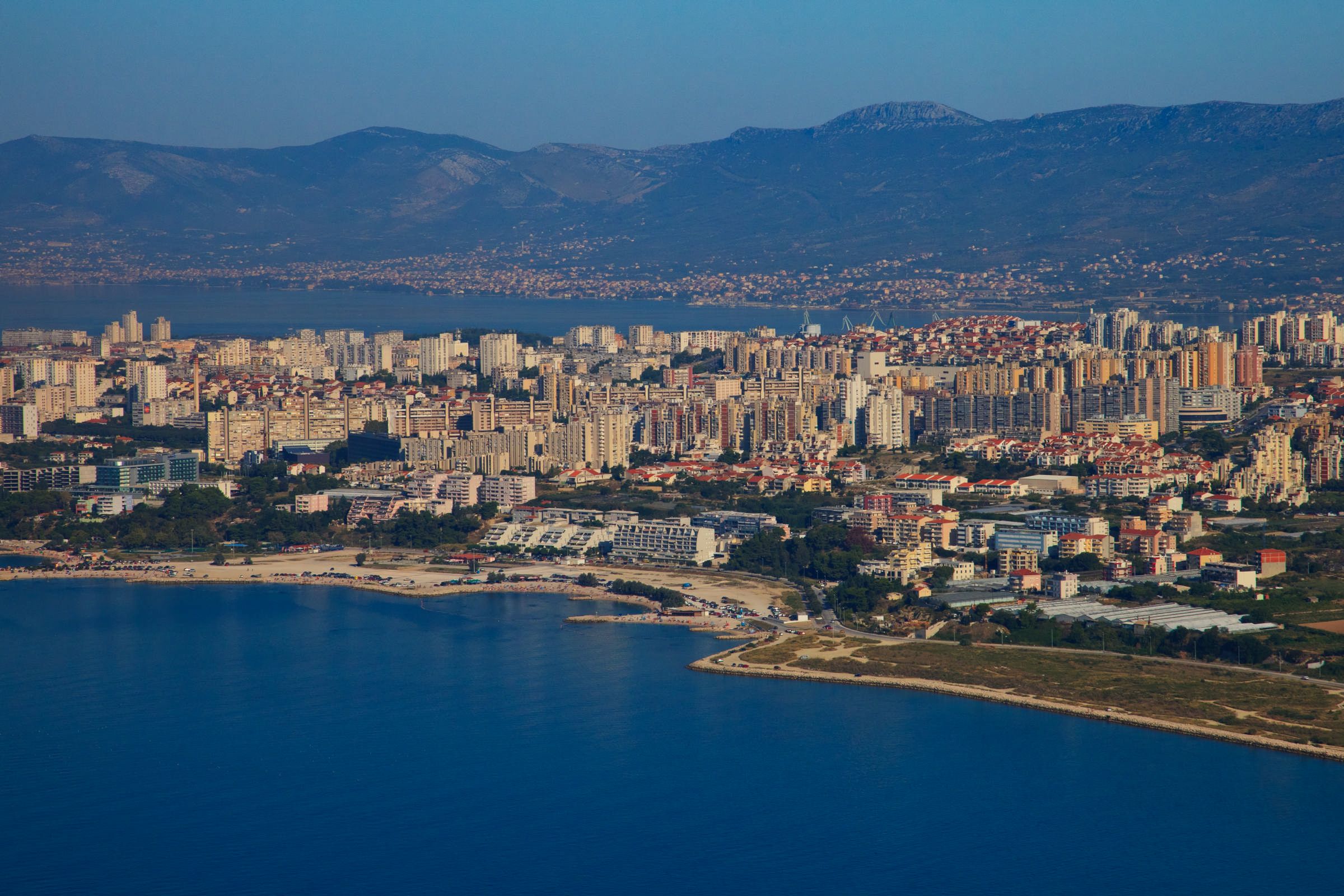
Their services are available in the Split-Dalmatia County / Copyright Romulić and Stojčić
This has proved successful for them so far. They earn enough for their needs and hope to be successful enough overtime to hire other students struggling with similar difficulties in finding jobs.
"After the physical work is done, we continue coordinating business for the next period, giving ideas and suggestions for new campaigns and designing a concept based on the mistakes we make," says Mario.
'You have to create opportunities for yourself'
On social networks, where they advertised from the very beginning, they received many supportive messages for their initiative. Their biggest reward, they say, is when clients promise to call them again and recommend them to a friend, neighbor, or godfather. And they are happy when they are greeted by kind and hospitable hosts and treated with some local delicacies.
Slowly but surely, they notice a positive business trend. People call them from Zagreb and even from abroad. Their next step is long-distance transport, outside Split-Dalmatia County, and in the future, they would like to try to organize transport outside the borders of Croatia.
"People are glad to see that young people are active and recognize that we fight to make it easier for our family, instead of sitting on a sofa and waiting for a job to fall from the sky. You can't cross your arms and expect opportunities. You have to create it yourself. Citizens appreciate that we are especially friendly to retirees for whom we have reduced transportation prices. We hope that you will hear more about us in the future if we succeed in other projects that we planned before the whole mess with the coronavirus," says Mario.
These two friends are a great example of how, with knowledge, resourcefulness, dedication, and hard work, it is possible to take control of your misfortunes and earn a few kunas in this unpredictable time.
For the latest travel info, bookmark our main travel info article, which is updated daily.
Read the Croatian Travel Update in your language - now available in 24 languages.
Students in Croatia Likely to Return to School on January 18
January 9, 2021 - Students in Croatia should return to classrooms on January 18, said the Ministry of Science and the City Education Office.
Jutarnji List reports that classes in Croatia, except those affected by the earthquake-affected Sisak-Moslavina County, should likely resume in schools on January 18, and the first day of classes in Zagreb schools should begin with evacuation exercises, revealed the Ministry of Science and City Education Office.
Over the next week, all counties should make decisions on teaching, and citing the favorable epidemiological situation related to COVID-19, Radovan Fuchs' ministry expects that the counties will mostly adhere to the A model of teaching. Namely, according to the MZO database of infected students, in the week before the holidays, from December 14 to 20, there were 2657 infected, and from January 1 to 7, the number dropped to 507 0.11 percent of students.
In the last week, Primorje-Gorski Kotar County recorded 76 COVID-positive schoolchildren (0.27 percent), Split-Dalmatia County 0.17 percent (93), Zagreb County 0.10 percent (31 students), and the City of Zagreb, if the data is to be believed, dropped to 108 positives, or 0.11 percent of students.
“We sincerely hope that the trend with small numbers of infected students will continue so that we can start the second semester with as many children in schools as possible,” said the advisor to the Minister of Education Božo Pavičin.
According to the confirmation of the head of the Zagreb Education Office, Ivica Lovrić, consultations with the Ministry on teaching began yesterday and will continue on Monday. In Zagreb, the earthquake is a priority, i.e., the safety of students in school buildings, which is why COVID fell into the background.
Parent associations and individuals ask questions about children's safety in old buildings, advocating for online teaching. Some school principals say the smaller cracks in buildings from the March earthquake have now widened and need to be repaired, even if such damage does not affect the facility’s functionality.
“Our school is certainly in better condition than before the earthquake in March because reinforcements were placed during the reconstruction. Therefore, the building is fortified, and whether it is safe, I really cannot claim. It is important to carry out evacuation exercises with students, adapted to each school building,” says Tihomir Engelsfeld, director of a Zagreb grammar school, whose building was badly damaged in March. The Petrinja earthquake on December 28 also caused a slight crack in the plaster.
The City Education Office says parents' fear is understandable but reiterates that most of the school buildings damaged in the March earthquake were well repaired.
In the event of a final decision to start teaching according to the A model, the City Office will appeal to teachers and school professional services to continue thematically on the first day.
“All schools will have an obligation to conduct evacuation exercises for all students on the first day of school,” says the head of the Zagreb Education Office, Ivica Lovrić.
In Sisak-Moslavina County, the online model is the most promising, combined with a mixed form of teaching.
Yesterday, the Ministry of Education sent an online questionnaire to the county education office for school principals in Banija to find out how many students do not currently live in their home, how many intend to return, the needs for textbooks and tablets, and how many students and teachers are without access to electricity and internet.
The president of the Association of Principals of Croatian Secondary Schools, Suzana Hitrec, hopes that the second semester will start with normal classes, except, of course, in schools affected by the earthquake.
“Now, it is important for us to conduct quality evacuation exercises in schools and to organize professional services for providing psychological assistance. The students have been stressed by COVID so far, and now by the earthquake. It is necessary to make them aware of what to do in case of an earthquake and not panic. Now we are all more sensitive than we have ever been before,” says Suzana Hitrec.
To read more about COVID-19 in Croatia, follow TCN's dedicated page.
All Full-Time Osijek and Baranja Students Get Free Train Travel
January 9, 2021 – From this year, full-time Osijek and Baranja students can get free train travel any time throughout their own county and for travel to educational centres anywhere in Croatia, in a new deal struck by the county and the national train operator
Once a sea bed, the vast flatlands of Slavonia are perfect for farming. At one time, this area was the breadbasket for much of Yugoslavia. It really wasn't so long ago that many folks left dry and dusty Dalmatia in search of employment and new lives on this fertile ground. Now, it's the other way round - Slavonian youth travel to the coast each summer in search of seasonal work. Others move to Ireland, Germany, Austria. Slavonia is losing many skilled younger people at an alarming rate. Increased mechanisation has reduced the need for labour in the area's agriculture. And, besides, most Slavonian youths are these days educated to a degree where their ambitions are greater than joining local agricultural endeavours.
In an area with limited possibilities, limited opportunities, education lies at the heart of survival in Slavonia. Local authorities know this and try to facilitate education as best they can. It is to that end that those in the Slavonian county of Osijek and Baranja have struck a deal with Croatia's national train operator to offer free train travel to all full-time Osijek and Baranja students.
Agreed upon at the end of last year, the scheme was implemented on 1 January 2021. Osijek and Baranja County has agreed to co-finance journeys for full-time Osijek and Baranja students who study not only within the county itself but across the whole of Croatia.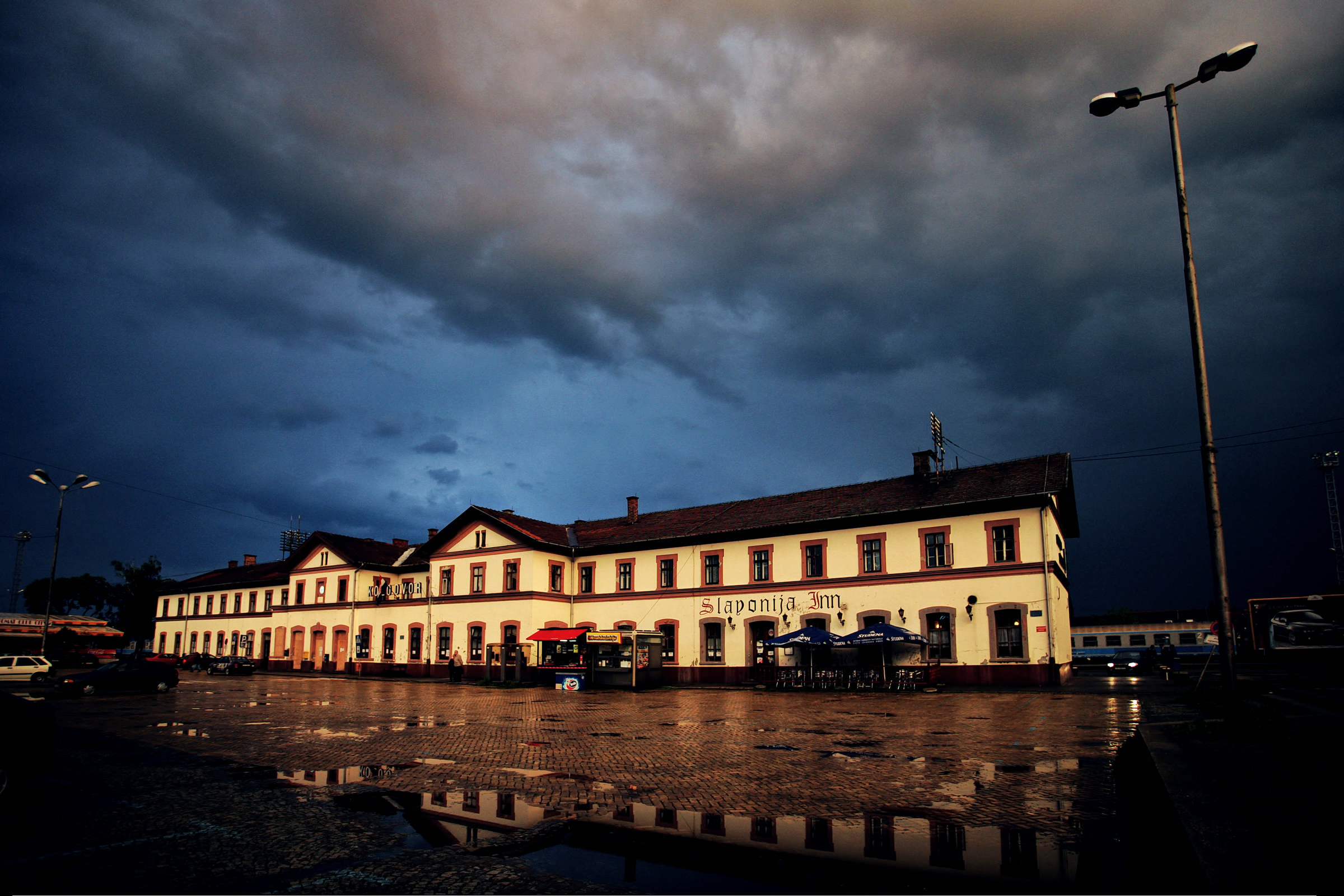 Osijek train station © Romulić & Stojčić
Osijek train station © Romulić & Stojčić
Monthly tickets for travel within the county already held a discount of up to 65 percent given to full-time students by the train operator, depending on the route. The County has now agreed to pay the remainder of the monthly ticket for all full-time Osijek and Baranja students. To meet the requirements of this deal, the departing and destination stations must both be in Osijek-Baranja County. The free monthly ticket allows an unlimited number of trips on the route, meaning that Osijek and Baranja students can also use the train for free on recreational journeys within the county.
The second deal sees the County co-finance 50% of journey costs for full-time Osijek and Baranja students who study elsewhere in Croatia, with the train operator HŽ agreeing to grant a discount to cover the other 50 %.
In order to obtain a free (monthly or individual) ticket, it is necessary to first obtain a certificate from their Administrative Department for the Economy. To get the certificate, Osijek and Baranja students must submit a copy of their identity card, a certificate of full-time study and two completed application forms (these can be found on the county's website www.obz.hr). Requests can be made in person or by mail (Osijek-Baranja County, Administrative Department for Economy, Županijska 4, Osijek or on the e-mail: This email address is being protected from spambots. You need JavaScript enabled to view it.
Free tickets can thereafter be bought by Osijek and Baranja students at the box office, prior to travel, or on the train itself, upon producing the relevant and needed documentation.
Faculty of Economics University of Zagreb Celebrates 100 Years
ZAGREB December 5, 2020 – With over 9000 students currently enrolled, the Faculty of Economics University of Zagreb is the largest faculty in Croatia. In 2020, this internationally renowned institution celebrates its 100th birthday, so TCN decided to take a closer look.
Every other student you meet in Croatia seems to study economy. It makes you wonder where they all go to after their studies are complete. Are there really so many positions for economists in Croatia?
In 2020, the Faculty of Economics University of Zagreb celebrates its 100th birthday. The long list of its famous former students gives a clue to where all the Croatian economists go – the tourism sector, diplomacy and international relations, business, politics and government.
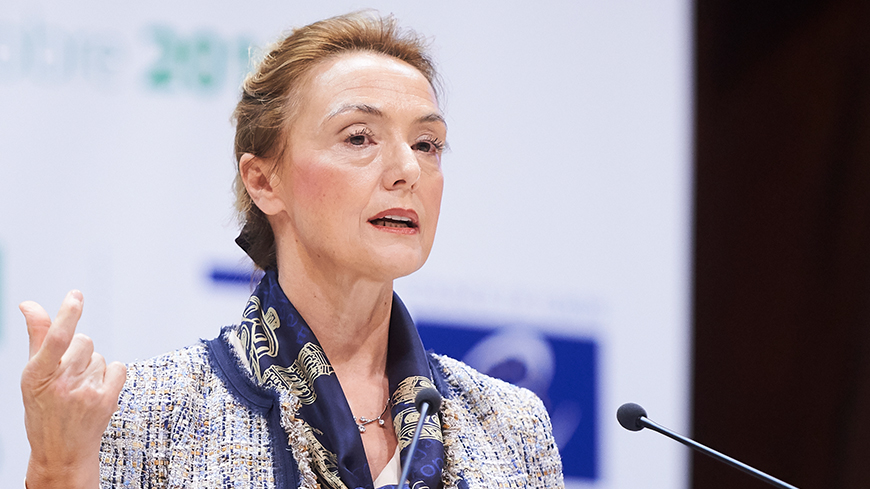 Marija Pejčinović Burić, a graduate of the Faculty of Economics of the University of Zagreb and the current Secretary General of the Council of Europe. After graduating, like Savka Dabčević-Kučar, she became o doctor of economics and before taking her current position served as Croatia's Deputy Prime Minister and Minister of Foreign and European Affairs © Council of Europe
Marija Pejčinović Burić, a graduate of the Faculty of Economics of the University of Zagreb and the current Secretary General of the Council of Europe. After graduating, like Savka Dabčević-Kučar, she became o doctor of economics and before taking her current position served as Croatia's Deputy Prime Minister and Minister of Foreign and European Affairs © Council of Europe
Graduates of the Faculty of Economics University of Zagreb have served as mayors of Zagreb and Split, Deputy Prime Minister of Croatia, Minister of Finance, Minister of the Economy, Secretary-General of the Council of Europe, Governers of the Croatian National Bank, Vice-President of the UN World Food Council, President of the Croatian Football Association, Minister of Environmental and Nature Protection, special advisors to the President of Croatia and countless university professors, including several former rectors of the University of Zagreb. Within its graduate professors, it has produced no less than 19 full members of the prestigious Croatian Academy of Sciences and Arts, more than any other single institution in the country.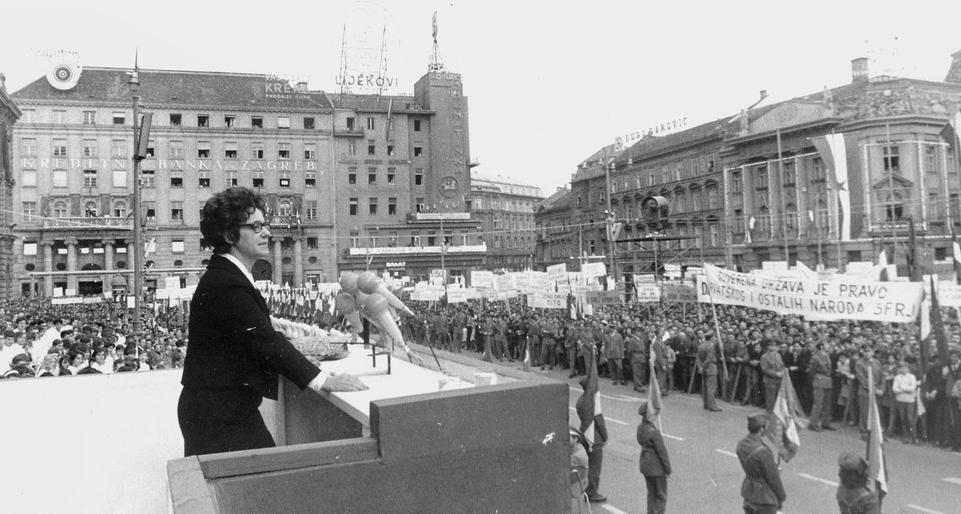 Savka Dabčević-Kučar, a graduate of the Faculty of Economics of the University of Zagreb. Born on Korčula, she became an anti-fascist in World War II, joining the partisans after her brother was beaten by fascists. After graduating, she continued to study at the faculty and became one of the first doctors of economics in Croatia, raising eyebrows by choosing to write her doctorate dissertation about a non-Marxist economic theorist (Englishman John Maynard Keynes). She became a professor at the faculty in the 1950s and despite her great advances in political life, remained a committed teacher at the faculty until 1971. In 1967, she was elected President of the Socialist Republic of Croatia. In 1969, she moved to an even more important position - that of president of the Central Committee of the League of Communists of Croatia. She was the first woman in Europe to be appointed head of government of a political entity and the first female in Croatia to hold an office equivalent to a head of government. In this picture, she addressed supporters on Ban Jelacic Square Zagreb during the movement called the Croatian Spring, which called for greater autonomy for Croatia. At the address, thousands cheered her as “Savka, queen of the Croats”. For her pivotal role in the movement, she was removed from her positions and public life and retired. She returned to politics in 1990 upon the collapse of communism in Europe and during the Croatian war of independence was one of the few politicians who visited the front lines of battle in Slavonia, Petrinja, Pokupski and the Dalmatian hinterland
Savka Dabčević-Kučar, a graduate of the Faculty of Economics of the University of Zagreb. Born on Korčula, she became an anti-fascist in World War II, joining the partisans after her brother was beaten by fascists. After graduating, she continued to study at the faculty and became one of the first doctors of economics in Croatia, raising eyebrows by choosing to write her doctorate dissertation about a non-Marxist economic theorist (Englishman John Maynard Keynes). She became a professor at the faculty in the 1950s and despite her great advances in political life, remained a committed teacher at the faculty until 1971. In 1967, she was elected President of the Socialist Republic of Croatia. In 1969, she moved to an even more important position - that of president of the Central Committee of the League of Communists of Croatia. She was the first woman in Europe to be appointed head of government of a political entity and the first female in Croatia to hold an office equivalent to a head of government. In this picture, she addressed supporters on Ban Jelacic Square Zagreb during the movement called the Croatian Spring, which called for greater autonomy for Croatia. At the address, thousands cheered her as “Savka, queen of the Croats”. For her pivotal role in the movement, she was removed from her positions and public life and retired. She returned to politics in 1990 upon the collapse of communism in Europe and during the Croatian war of independence was one of the few politicians who visited the front lines of battle in Slavonia, Petrinja, Pokupski and the Dalmatian hinterland
The Faculty of Economics University of Zagreb is the largest faculty in the country. Over its 100 year history, it has established itself as an internationally respected institution. Today, it has around 9000 persons enrolled, caters for international students with some courses in English and has produced over 86, 000 graduates, including 856 doctors of science.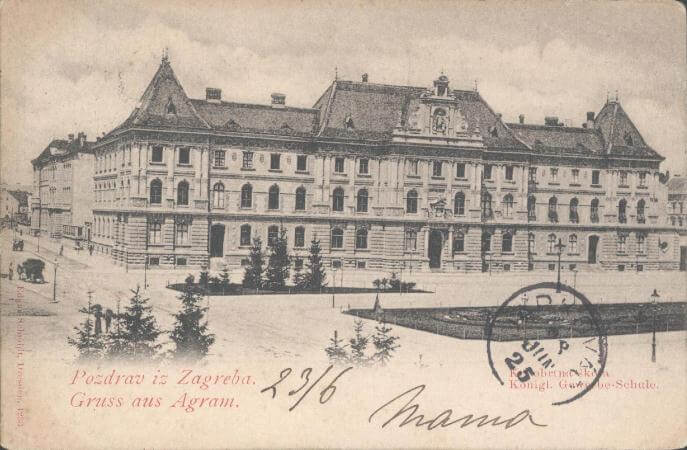 In its infancy, students of the College of Trade and Transport were taught at the Technical College, which is today the Museum of Arts and Crafts in Zagreb © National and University Library in Zagreb
In its infancy, students of the College of Trade and Transport were taught at the Technical College, which is today the Museum of Arts and Crafts in Zagreb © National and University Library in Zagreb
The history of the Faculty of Economics University of Zagreb starts with the opening in 1920 of its forerunner, the Zagreb College of Trade and Transport. Its purpose was to educate in the areas of banking, domestic and international trade, transport, consular services, insurance and the education of teachers. Its courses lasted three years and it proved so popular that in the academic year 1923/24, some 1,125 students were enrolled.
The institution held college status until 1925 when Stjepan Radić became the Minister of Education. It must have been unusual for Radić to find himself as part of the government of the Kingdom of Serbs, Croats and Slovenes, the state which preceded the Kingdom of Yugoslavia. Today, Radić is best remembered as a politician outspoken in his advocacy of autonomy for Croatia. Before his appointment to the government, he had always done so in opposition. Indeed, he had been imprisoned several times for his views, which were proclaimed loudly in his writings or in person (he was a gifted public speaker). As recently as March 1925 he had been in prison but, when the political party of which he was a member officially recognised the monarchy and the state constitution, he was freed. In a remarkable turnaround, before the year's end, he was a minister in the government.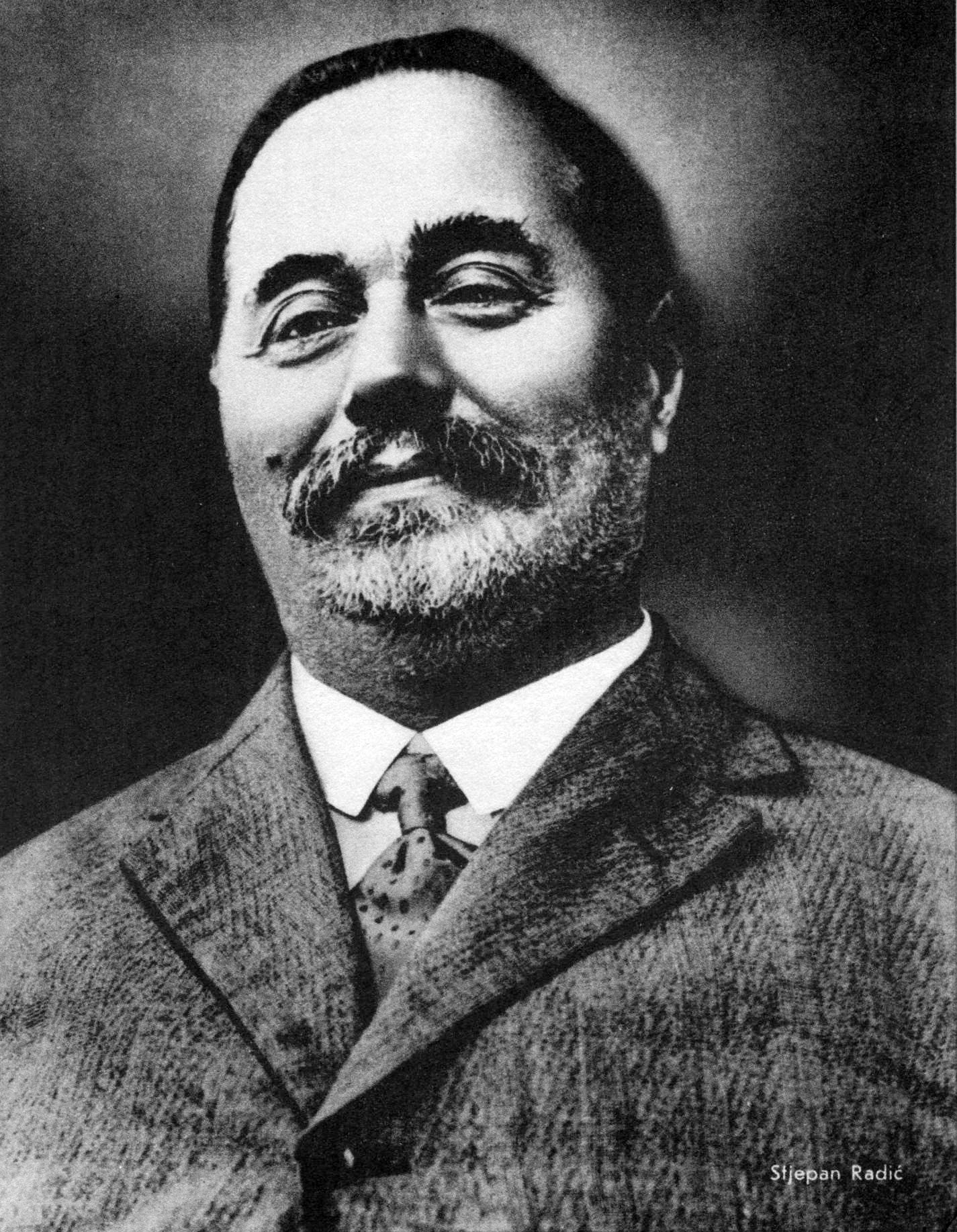 Stjepan Radić, pictured in the 1920s © public domain. In 1895 Radić was sent to prison for the public burning of the Hungarian flag in Zagreb – alongside Antun Dabčević, the father of Savka Dabčević-Kučar.
Stjepan Radić, pictured in the 1920s © public domain. In 1895 Radić was sent to prison for the public burning of the Hungarian flag in Zagreb – alongside Antun Dabčević, the father of Savka Dabčević-Kučar.
Stjepan Radić's desire for Croatian autonomy was not born from the ideals of the political class of Zagreb. The ninth of eleven children, born to a peasant family in a small village on the banks of the Sava river, just north of Sisak, Radić was very much a representative of the people whence he came. To him (and others in his family – his brother and nephew also being prominent politicians), education had the most important role to play in emancipation. He had lived in poverty in order to complete his own - after being banned from university-level educational institutions throughout the whole of the Austro-Hungarian empire for his protests against the state, he travelled penniless to Russia, France and Switzerland to complete his studies. In the latter, finance was one of his chosen subjects.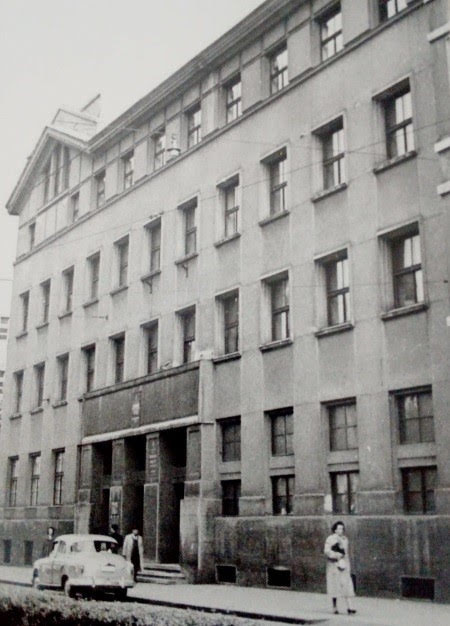 The first dedicated building of the Higher School of Economics and Commerce was located on the corner of Bauerova and Zvonirmirova © Faculty of Economics University of Zagreb
The first dedicated building of the Higher School of Economics and Commerce was located on the corner of Bauerova and Zvonirmirova © Faculty of Economics University of Zagreb
Under Radić's spell in office, the Zagreb College of Trade and Transport became the Higher School of Economics and Commerce. Its courses extended to four years, it attained university status. With no building designated to the increasingly popular institution, students had sometimes been taught at the Technical College (today's Museum of Arts and Crafts) and in parts of what is now the Mimara Museum. A dedicated home for the faculty was authorised and its construction started in 1927. Classes began at the faculty, located on the corner of Bauerova and Zvonimirova, in 1928, but within the decade the institution had outgrown its home and a plot of land in Svetice was acquired in order to build a new, larger facility. Its construction was interrupted by the Second World War and students would end up being taught on the Bauerova and Zvonimirova site all the way up to 1952.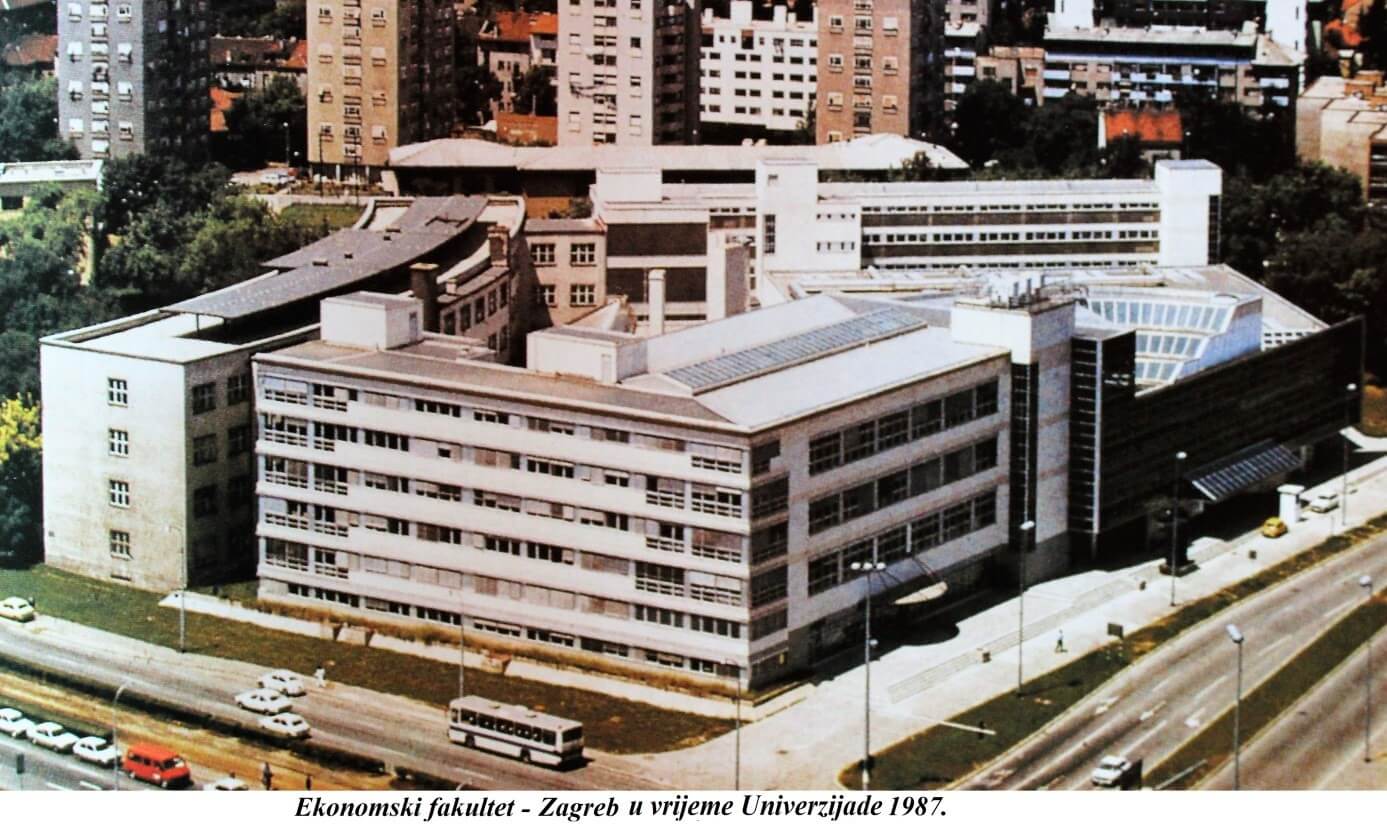 The faculty's modern building, pictured in 1987. Today, the faculty has 17 departments - Finance, Demography, Economic Theory, Business Economics, Informatics, Macroeconomics and Economic Development, Marketing, Mathematics, International Economics, Business in Foreign Languages, Organization and Management, Law, Accounting, Statistics, Trade and International Business, Tourism, Physical Education and Health © Faculty of Economics University of Zagreb
The faculty's modern building, pictured in 1987. Today, the faculty has 17 departments - Finance, Demography, Economic Theory, Business Economics, Informatics, Macroeconomics and Economic Development, Marketing, Mathematics, International Economics, Business in Foreign Languages, Organization and Management, Law, Accounting, Statistics, Trade and International Business, Tourism, Physical Education and Health © Faculty of Economics University of Zagreb
In 1947, the Higher School of Economics and Commerce became the Faculty of Economics University of Zagreb. In 1952, the faculty officially moved to the new site in Svetice. In 1968 it expanded once more when it merged with the 12-year-old College of Economics. Since then, the building at Svetice has received major upgrades and further facilities of the faculty can now also be found at the university campus in Borongaj, in Varaždin, in Koprivnica and in Bjelovar. After a century of existence, the Faculty of Economics University of Zagreb's longstanding difficulties to meet the popularity of its courses with the space available are now over. Not only can they accommodate every Croatian economy student who makes the grade, but they are also able to offer places to some of the best international students. It would surely come as no surprise if they are still educating the future elites of business, banking, finance and politics in another 100 years.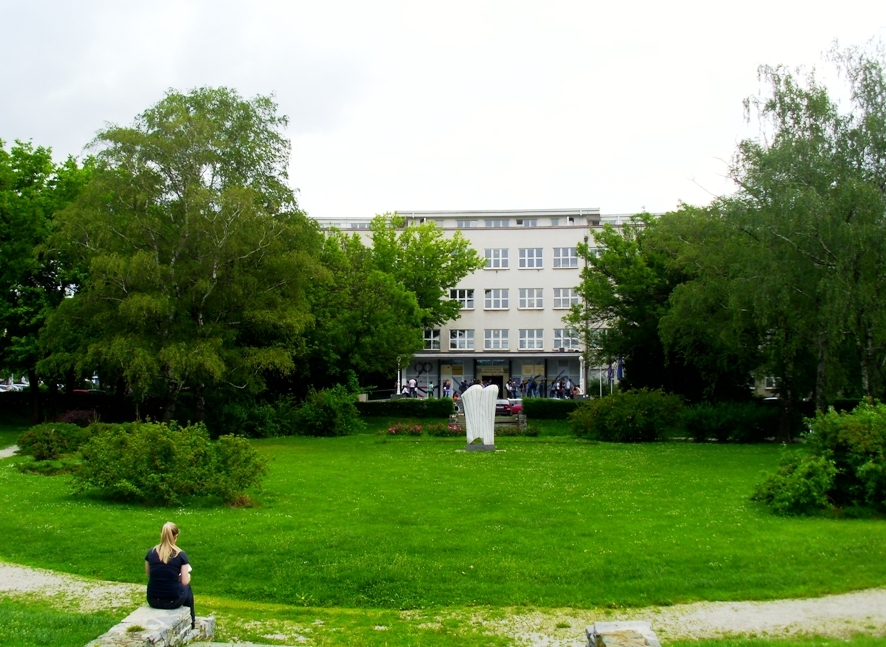
The Faculty of Economics University of Zagreb site in Svetice, as seen from its garden © Wolf - Pidgeon
Croatian Dejan Nemcic The Best Geography Teacher In The World
ZAGREB October 23, 2020 – Croatian professor Dejan Nemcic is the best geography teacher in the world. He was awarded the status in the annual Global Teacher Awards for the vivid and imaginative way he engages students
Croatia has the best geography teacher in the world. Dejan Nemcic from Ivo Andrić Elementary School in Sopot, Zagreb was on Thursday 22 October named as the winner in his class by the annual Global Teacher Awards. He is one of the few winners this year from this part of Europe.
After he was named a recipient of the award, Dejan Nemcic was interviewed by Croatian media outlet 24sata. In the interview, he dedicated the award to his students.
Dejan Nemcic, who is originally from Garešnica in the south of Bjelovar-Bilogora County, was nominated because of the vivid and imaginative way he engages students in geography. Using online communications and multi-media he places students directly within the environments they're learning about.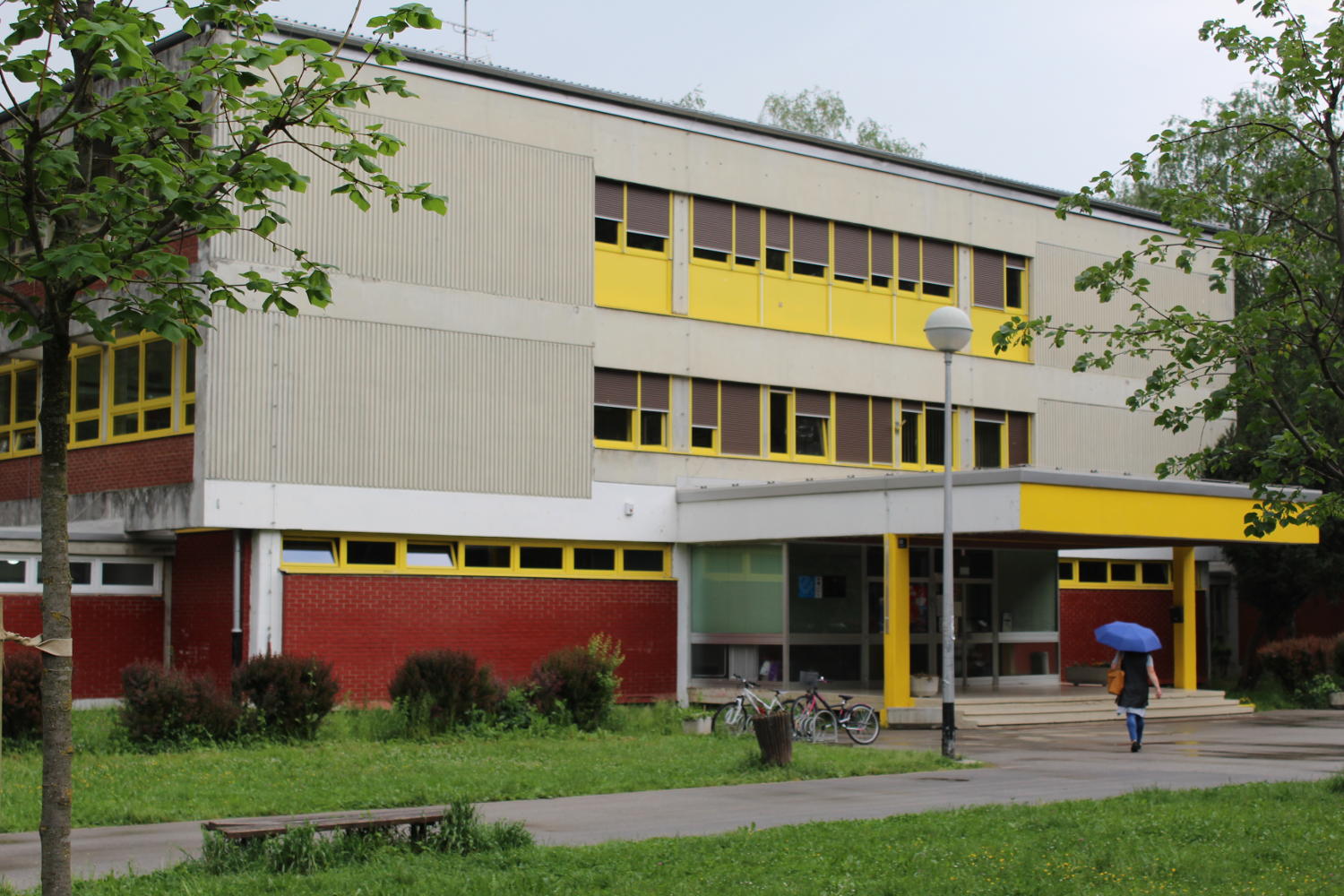 Ivo Andrić Elementary School in Sopot, Zagreb, where Dejan Nemcic teaches his inspired geography lessons © Ivo Andrić Elementary School
Ivo Andrić Elementary School in Sopot, Zagreb, where Dejan Nemcic teaches his inspired geography lessons © Ivo Andrić Elementary School
“I tell sixth-graders about the disappearance of the Amazon rainforest,” Dejan Nemcic detailed to 24sata as an example of his methods. “Then, my colleague Ana is waiting for us in a boat on the Amazon and we see everything as it really is. It’s the same with the favelas in Rio de Janeiro.” Using such collaborations and techniques he has allowed his students to travel the world from their classroom. He teaches everything that is included in the official curriculum but, with the blessing of the school administration, is free to teach it in his own inspiring way.
Around 150 members of the Croatian diaspora, located in the four corners of the earth, assist as part of the extended network of collaborators Dejan Nemcic has built over the last decade.
Educators from all over the world are included in the annual Global Teacher Awards. Teachers are nominated for inclusion by those who respect and admire their work. Dejan Nemcic was nominated by the EduBalkan platform.
For the latest travel info, bookmark our main travel info article, which is updated daily.
Read the Croatian Travel Update in your language - now available in 24 languages.
Croatia's Business Matchmaker - Project Which Pairs Students with Firms
As Poslovni Dnevnik writes on the 23rd of March, 2019, Business Matchmaker, organised by the eSTUDENT student association and the Office for consulting and career development at Zagreb's Faculty of Economics, will be held on the 26th of March this year at Zagreb's Faculty of Economics (Trg JF Kennedy 6), beginning at 9:00. The completion of the official part is expected to be at 15:00.
This innovative project allows students to personally present themselves in a short four minute selection interview to a group of desired companies. Interviews will be held in the halls of the faculty, and the continuation of the meeting and greeting, to which all participants are invited, will be in "Kefi" after 15:00 that same day.
Business Matchmaker is an event which resembles the speed dating principle and is intended for EFZG students to represent themselves to their potential employers. After the interview, employers and students will evaluate each other and the best students can then expect another round of interviews, where they will be able to learn more and find out more about employment opportunities in their desired companies.
In this interesting and useful way, students on the lookout for an employment position are able to properly develop their self-presentation skills and get to know how the labour market works firsthand. This year's Business Matchmaker will see the participation of as many as 21 companies divided into five different groups.
Lucija Matašin shared her personal experience of last year's Business Matchmaker and what it did for her career-wise:
"By participating in Business Matchmaker, I got a student job, which is honestly everything but ''student'' style. Along with that [I got] a great reference for my CV and a lot of motivation and courage to make it easier to deal with stress in similar situations in the future. I met the people from the company, which I might once meet again, because the world is really small and who knows where I'll be tomorrow, and maybe I'll bump into some of these people again on my way. This eSTUDENT initiative and the Office for consulting and career development really provide EFZG students with something they don't get through their classes.''
The companies participating in the project are 24sata, Addiko Bank, Atlantic Grupa (Group), ATOS, British American Tobacco, Croatia Osiguranje (Insurance), Deloitte, DIV Group, EC, INA, Kaufland, King ICT, KPMG, L'Oreal Adria, mStart, Philip Morris Zagreb, Samsung, SofaScore, Syskit, Talentarium and Zagrebačka banka.
Make sure to follow our dedicated business page for much more.


